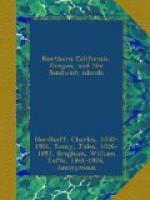CANTO II.
I had a friend with whom
I lived peacefully in the wilderness.
I swung like a cloud full of rain,
I murmured like a rivulet,
I shook like a thunder-bolt,
I overturned every thing like an earthquake,
I flashed as lightning,
I consumed like the sun.
Yellow was the ohia leaf;
Unfolding, it turned yellow
Under the rain of the four clouds,
In the month of the four ole,
When the fisherman, four ropes
Upon his back, enjoyed calm and fair weather.
Be Lord, be lord of the weather.
O Owl, whose cries give life!
Send down the rain upon the lehua;
Let the rain come again upon
The buds of the lehua. Rest, O Sun!
Let the wind fly
Before the face of the clouds.
Rest, O Sun!
Return, O Ocean of the mighty waters;
Great is thy tumult! Sun rest here.
Rest, O Sun! I will cast my net
At the first headland;
I shall catch the wind.
I will cast my net
At the second headland;
I shall catch a tempest.
I will cast forth my net
At the third headland;
I shall get the south wind.
I will cast forth my net
At the fourth headland;
I shall take above, below,
Land and sea—
I shall take Uhumakaikai.
At a single word of Hina
He shall fall; hard pressed
Shall be the neck of Uhumakaikai.
In the sixteenth verse of this second canto Kawelo invokes the owl, which the Hawaiians regarded as a god. In extreme perils, if the owl made its cries heard, it was a sign of safety, as the voice of this bird was sacred; and more than once has it happened that men, destined to be immolated on the altar of sacrifices as expiatory victims, have escaped death merely because the owl (Pueo) was heard before the immolation. It is easy to understand, after this, the invocation that Kawelo made to Pueo when he found himself in combat with the terrible Uhumakaikai.
In the third canto Kawelo endeavors to destroy the monster. He commences by saying that he, a chief (ka lani), does not disdain to work as a simple fisherman. Then he pays a tribute to those who have woven the net he is going to use to capture the monster of the sea. The olona (Boehmeria), a shrub whose bark furnishes the Hawaiians with an excellent fibre, was regarded as a sort of deity. Before spinning its fibres, they made libations, and offered sacrifices of hogs, fowls, etc. Kawelo refers to all this in his song.
PAHA EKOLU.
Huki kuu ka lani
Keaweawekaokai honua,
Kupu ola ua ulu ke opuu.
Ke kahi ’ke olona.
Kahoekukama kohi lani.
O kia ka piko o ke olona,
Ihi a ka ili no moki no lena,
Ahi kuni ka aala,
Kunia, haina, paia,
Holea, hoomoe ka Papa,
Ke kahi ke olona,
Ke kau ko opua,
Ke kea ka maawe
Kau hae ka ilo ka uha,
Ke kaakalawa ka upena:
O kuu aku i kai,
I kai a Papa; ua hina,
E hina, kohia i ka aa
O Uhumakaikai.




